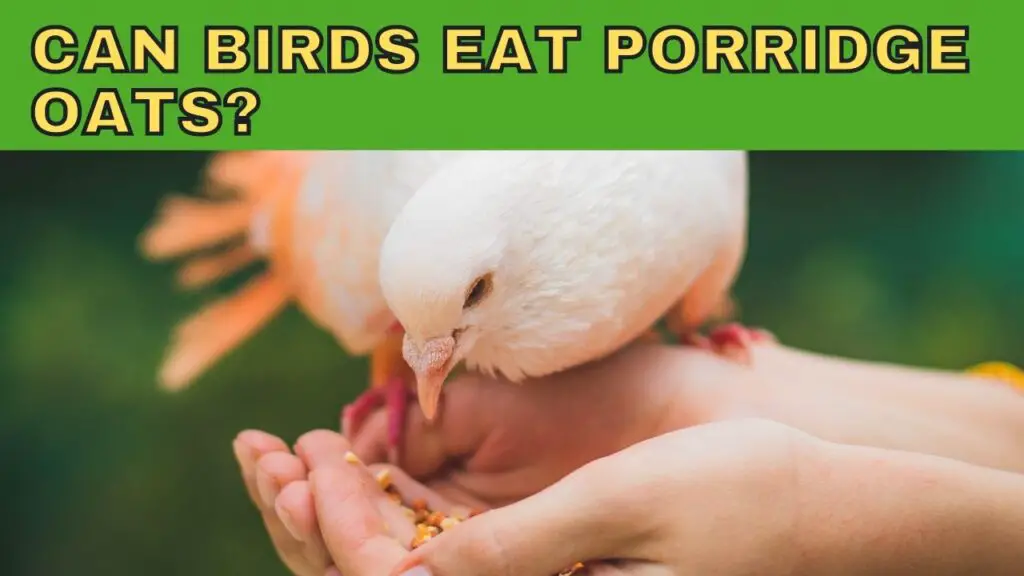Can birds eat oats soaked in grease? Can birds eat oatmeal oats? What human food can birds eat? Find out how to safely feed garden birds.
Feeding the birds in your back garden is a popular pastime across the globe. In fact, it’s estimated that about half of households in the United States, the United Kingdom and Australia feed birds. Not only is feeding the birds a great way to connect with nature, but it can help birds to get the nutrients they need.
Can Birds Eat Porridge Or Oatmeal Oats?
Yes. Birds can eat small amounts of uncooked porridge or oatmeal oats. In fact, raw oats are a great source of nutrition for birds, especially during winter. Blackbirds in particular love oats. When feeding birds oats, there are a few important things to remember:
- Never feed birds cooked oats. These become sticky when cooked and dry like cement, potentially gluing the bird’s beak closed.
- Dried oats can turn into a pulp when wet, so always leave out some water for the birds alongside the oats.
- Don’t overdo it. Only leave small amounts of raw oats out for birds at a time.
- Think hygiene. Throw away leftover oats after a few days if not eaten to avoid spreading illness or parasites.
Why are Oats Good For Birds?
Oatmeal oats are packed with slow-release carbohydrates, which give birds a steady energy supply and help them to preserve heat in cold weather. Oats are also rich in protein, B vitamins, magnesium, zinc, and a number of other vital vitamins and minerals.
Like humans, birds need a varied diet so it’s best to mix the oats in with other suitable foods such as dried mealworms, seeds, and soft apples or bananas cut into small pieces.
Do All Birds Eat Oats?
Most granivorous birds eat oats, such as doves, pigeons, blackbirds, finches, sparrows, and game birds like partridges and grouse. For ground-eating birds like blackbirds, sparrows, and blue jays, it’s best to scatter the oats on your lawn.
What Oats Are Best For Birds?
Uncooked pinhead oats, rolled oats, or steel-cut oats are great options for feeding garden birds. Avoid instant oats from sachets or pots as they’re full of sugar, milk powder, and other additives that are dangerous for birds.
Ways to Feed Oats to Garden Birds
You can serve the uncooked oats to birds by scattering them on the ground in your garden or on your bird table. If you have a bird feeder, you can simply add them to the feeder like any other seed mix.
Another great way to serve oats to the birds in your garden is by mixing them into your regular seed mix. This ensures the birds are getting a balanced diet and reduces the amount of food waste in your garden.
During the winter months, fat balls are a great food source for birds. Fat balls are simple to make. They contain two parts hard fat such as lard or suet to one part dry ingredients such as uncooked oats, dried fruit, and seeds. It’s best to avoid leaving fat balls out during warm weather as these turn rancid quickly in warm temperatures.
Can Birds Eat Oats Soaked in Grease?
The short answer is yes. Having said that, you have to be very careful about the type of grease you serve to birds. It’s always best to avoid feeding birds soft fats that spread easily. If a bird lands directly on a fat ball or feeder, the fat gets on its feet and can spread to its wings and other parts of its body. Rather than using grease from bacon or other cooking fats, mix the oatmeal oats with lard or suet for a tasty, healthy treat for the birds in your garden. Pure fats that are hard, dry, and crumbly are a much safer option because they won’t get stuck to the bird.
Birds need their feathers for insulation and waterproofing, so it’s imperative that grease, fat, or meat juices don’t smear on the feathers. In addition to the risk to the health of the wings, fat is a breeding ground for bacteria that could cause the birds harm. Cooking fats, for example, can contain varying amounts of salt, making them unsafe for birds.
That doesn’t mean that you should avoid feeding grease to the birds in your garden altogether. You simply need to be extra cautious. Birds need a lot of fat to survive food shortages and harsh winters, so the fat content in grease can be extremely beneficial in moderation.
To ensure you’re serving fat to birds in a safe way, follow these tips:
- Avoid leaving out food with traces of salt, spices, or sauces.
- Never feed birds dried bacon.
- Stick to pure fats like lard or suet that won’t smear.
- Don’t leave fat balls out in warm temperatures.
- Regularly throw away leftover food and avoid home-made fat balls and other foods to reduce the spread of bacteria.
- Only feed birds small quantities of grease to avoid health issues.
What’s The Best Time Of Year To Feed Birds?
Feeding birds (good quality, safe) food and water all year round gives them the best chance of surviving food shortages, but it’s especially important during the winter months. Birds need foods that are high in fat during the winter to keep up fat reserves.
While it’s not quite as crucial in summer, birds still need a high-protein diet – especially when they are moulting. In the summer months, black sunflower seeds, seed mixtures (without peanuts), soaked sultanas, raisins, and currants, and mealworms are great food options. It’s best to avoid bread, peanuts, and fats as these can be dangerous to birds’ chicks.
